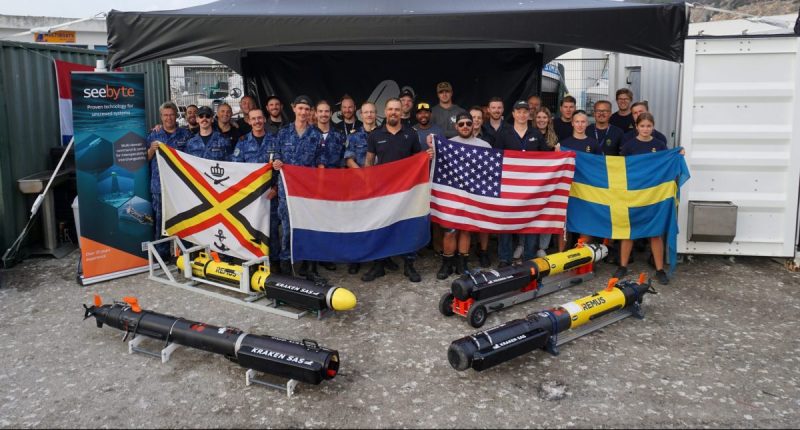- Kraken Robotics (TSXV:PNG) tech performed well in tests for five NATO navies last month at a Portuguese event
- The company showed off its Miniature Synthetic Aperture Sonar at the annual Robotic Experimentation and Prototyping with Maritime Unmanned Systems
- These systems combined were able to locate more than 50 mine-like targets over the course of the exercise (including redundant coverages)
- Kraken Robotics stock last traded at C$1.76 per share
Kraken Robotics (TSXV:PNG) tech performed well in tests for five NATO navies last month at a Portuguese event.
Based out of St. John’s, Newfoundland and Labrador, the developer of complex subsea sensors, batteries and robotic systems showed off its Miniature Synthetic Aperture Sonar (MINSAS) at the annual Robotic Experimentation and Prototyping with Maritime Unmanned Systems (REPMUS) that ran from Sept. 9 to 27.
Five Kraken MINSAS modules were installed into U.S., Dutch, Swedish, Belgian and Portuguese uncrewed underwater vehicles (UUVs). Combined, these systems were able to locate more than 50 mine-like targets over the course of the exercise (including redundant coverages).
“REPMUS has been an invaluable experience for our team at Kraken, providing the opportunity to work directly with end-user navies, demonstrate the capabilities of MINSAS, support the rapid processing of data from multiple missions, and get real-time feedback from users that we can integrate into our product roadmap,” company president and CEO Greg Reid said in a statement. “Our team supported integration of SAS modules on several different UUV configurations including legacy REMUS systems that were more than 10 years old, the U.S. Navy’s MK-18 Mod 1, REMUS 100 NGR, and a Gavia vehicle. This illustrates the versatility of our technology to be rapidly deployed and exchanged between both new and legacy platforms, providing a significant capability enhancement for mine countermeasure operations from UUVs.”
During the exercise, Kraken’s MINSAS was employed for various tasks such as area search and reacquisition / identification. The use of real-time beamforming and georeferencing allowed for the swift retrieval of data from payloads, enabling immediate post-mission analysis when the UUVs returned to shore, utilizing SeeByte’s SeeTrack C2 System.
Kraken SAS also participated in a multi-national collaborative autonomy exercise aimed at surveying mine-like objects in a comprehensive “find-fix-finish” mission. The exercise was planned and executed using SeeByte’s SeeTrack and Neptune collaborative autonomy software, in conjunction with the U.S. Navy’s C2 and TAK (Team Awareness Kit). SeeTrack also facilitated the tasking of a VideoRay Defender remotely operated vehicle to perform an in-stride digital ‘Finish’.
Kraken’s MINSAS provides high resolutions of up to 2 centimetres by 2 centimetres (post-processed) at a range of 200 metres per side, all within a compact and lightweight design. It is engineered for seamless integration across various platforms, including UUVs, remotely operated vehicles, and Kraken’s KATFISH towed SAS. Since 2015, Kraken has been supplying MINSAS systems to defence and commercial customers in more than 15 countries globally.
Kraken Robotics is a marine technology company providing complex subsea sensors, batteries and robotic systems.
Kraken Robotics Inc. stock (TSXV:PNG) last traded at C$1.76 per share and has risen 170.77 per cent since the year began.
Join the discussion: Find out what everybody’s saying about this Canadian micro-cap tech stock on the Kraken Robotics Inc. Bullboard, and check out the rest of Stockhouse’s stock forums and message boards.
The material provided in this article is for information only and should not be treated as investment advice. For full disclaimer information, please click here.
(Top image of Kraken’s MP-SAS was integrated on Belgian, Dutch, American and Swedish REMUS 100 UUVs during the annual REPMUS exercise: Kraken Robotics Inc.)

